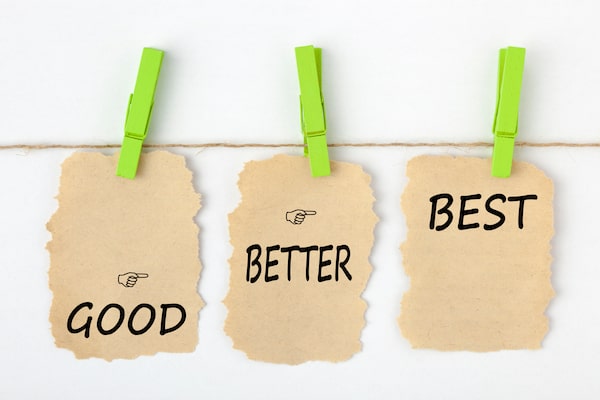
OGNYAN CHOBANOV/istock
For most of us, the first decision-making process we probably encountered was the pros-and-cons list. A simple tally of the pluses and minuses of a proposed course of action, it helped clarify the situation but seemed lacking: Just counting the number of items on each side of the ledger didn’t always seem to be enough.
Another early trick, at least for me, was to flip a coin. I was giving up control; sometimes when the coin landed I disliked the choice – and knew immediately it was wrong. These days, that’s considered a good thing, doing what your gut tells you. And the gut, as much as the brain, is involved in decision-making.
Either one can lead us astray, however.
Many people these days build on the pro-con list with more detailed matrices, evaluating options according to important criteria – maybe for buying something, we consider the price, quality, speed, and reliability. Score each with not too many gradations, 0 to 5 is the usual recommendation. But then you probably want to weigh the importance of those factors as well. Maybe price and quality are the most vital, so they count as double toward your decision.
But it’s not just the numbers. As with the coin flip, you will have an emotional reaction and it can tell you what you want. You then have to pick between – or integrate – head and heart. In Mind Tools for Managers, consultant James Manktelow and London Business School Professor Julian Birkinshaw add that you should always use your intuition to check your answer; if you sense the decision is off, review your assumptions.
Behavioural economists in recent years have opened our eyes to the traps our emotions can lead us into during decision-making. One trap is that we fear what potentially could go wrong more than we value what could go right. I was taken recently by a deeper look at regret by Verena Stingl, a PhD fellow at the Technical University of Denmark, and two professors at that institution, Joana Gerald and Josef Oehmen, writing in the LSE Business Review. Rather than picking the best option from all the strategic alternatives, they suggest we should focus on eliminating the worst possibilities.
There is never enough time to properly evaluate all the options in a fast-changing, highly uncertain world. So executives, they found, aim to simply minimize regret – and while that seems foolish, the authors note that it fits with strategy guru Michael Porter’s argument that strategy is about deciding what not to do.
So, how can you do that quickly and reliably? The executives look for clear knock-out criteria such as strategic opportunities with unlimited financial liability. More ambiguous criteria will exist, where executives might disagree, such as whether you want to bid to work with the client. Beforehand, establish guidelines to help you settle those knock-out issues. Finally, if several knock-out criteria appear, abandon that option.
Hindsight bias has been getting a lot of attention. That’s our tendency to forget what we were thinking when we made a decision and recast that later according to how it played out. Pinterest founder Ben Silbermann keeps a decision journal and says writing down his reasoning at the time of a decision has helped him to improve his overall decision-making, notably on whether he should have trusted his gut. “If you don’t write down a decision you made and why, there’s so many things going on that it’s very hard to remember exactly what you were thinking at the time, because you have this kind of running dialogue that’s being updated along the way,” Medium.com reports him saying in a recent talk.
Top poker player Annie Duke highlighted the danger of judging your decisions by outcomes, which Nautilus magazine called the “resulting fallacy” – the most important fallacy you have never heard of. “Know that the way things turn out has a lot of luck involved so don’t be so hard on yourself when things go badly and don’t be so proud of yourself when they go well. Focus on process instead,” she said. And on the gut, of course.
Cannonballs
- Here are two unusual, probing questions to ask candidates in job interviews. What’s your favourite board game? from Michael Pearce of the Addison Group. Tell me about a wrong decision you have made? from Varda Shine of Merryck & Co.
- If you have two subordinates who are always jousting, have them trade jobs for a period of time to understand each other’s situations, suggests venture capitalist Ben Horowitz.
- Worth Reading: In the new book Unlocking the Customer Value Chain Thales Teixeira, a professor at Harvard Business School, reinterprets much of our current digital disruption through the notion of decoupling – studying the actions a customer takes in making a purchase and focusing on just one critical aspect, separating it from other steps.
Stay ahead in your career. We have a weekly Careers newsletter to give you guidance and tips on career management, leadership, business education and more. Sign up today.
 Harvey Schachter
Harvey Schachter